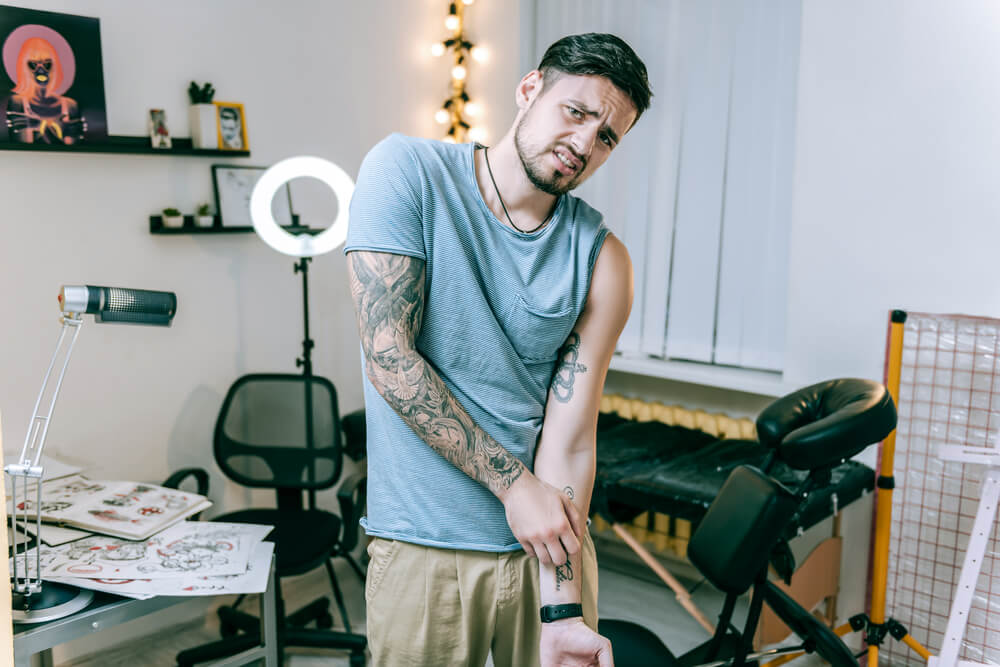Do you have an itch that just won’t quit? If it’s your tattoo that’s causing the problem, there are a few things you can do to try and get relief. Throughout this article, we’ll try to cover all you need to know. We’ll discuss why tattoos itch in the first place and then we’ll give you some tips on how to stop the itch so you can enjoy your ink!
What can cause tattoo itches?
There are a few different things that can cause tattoos to itch. The most common culprit is dry skin. When the skin dries out, it can become irritated and itchy. This is especially common in areas where the tattoo is new, and the skin is still healing.
Allergic reactions
Another common cause of itchy tattoos is an allergic reaction to the ink. This can happen even if you don’t have a history of allergies. Ink allergies can occur in anyone.
Potential Infections
Finally, prolonged itchy tattoos can also be a sign of an infection. This is more common with new tattoos, as the skin is still open and vulnerable to bacteria. If you think your tattoo may be infected, it’s important to see a doctor or tattoo artist right away.
Apply a cold compress
One of the best ways to stop a tattoo from itching is to apply a cold compress. This is also one of the most common ways of dealing with itchiness and irritation around a new tattoo.
This will help to reduce the inflammation and swelling that can cause discomfort. Simply place a cold pack or ice pack on the area for a few minutes at a time until the itch subsides.
Take an antihistamine
If the itching is caused by an allergic reaction, taking an antihistamine can help to provide relief. Make sure to speak with your doctor before taking any over-the-counter medications, as some can cause side effects.
Apply a topical cream or ointment
If the itching is caused by dry skin or a rash, applying a topical cream or ointment can help to soothe the area. Look for a cream or ointment that contains cortisone or other ingredients that will help to reduce inflammation and itching.
Moisturize the area
In addition to applying a topical cream or ointment, it’s important to keep the tattoo moisturized. This will help to prevent the skin from drying out and becoming irritated. Apply a tattoo aftercare lotion or cream several times a day and be sure to keep the area clean and dry.
Wear loose clothing
Tight clothing can irritate the skin and make the itch worse. If your tattoo is itchy, wear loose-fitting clothing to help prevent further irritation. Wearing loose clothing can also help to reduce the amount of friction on the tattoo and relieve the itch.
Avoid scratching
It may be tempting to scratch an itchy tattoo but resist the urge! Scratching can damage the skin and cause the tattoo to heal poorly. If you must scratch, do so gently with your fingers. Avoid using anything sharp or abrasive, as this can lead to infection.
Drink plenty of fluids
Drink lots and eat foods that are high in antioxidants to help your body heal faster and reduce itching. Fluids can also help to flush out toxins that can irritate. Antioxidants can reduce toxins and inflammation, which can help to speed healing.
Avoid super-hot showers
Hot water can dry out your skin and make the itch worse. Stick to lukewarm water when showering or bathing and avoid scrubbing the area too vigorously. Gently pat the tattoo dry with a clean towel after bathing.
Keep the area clean
Make sure to clean the tattooed area as directed by your artist or doctor. This will help to prevent infection and irritation. Use a mild, unscented soap and avoid scrubbing the area. Softly dry the tattoo with a clean towel after cleansing.
Change your laundry detergent
If you find that your tattoo is itchy after you’ve washed your clothing, it may be the detergent you’re using. Some laundry detergents contain ingredients that can irritate. Switch to a hypoallergenic or fragrance-free detergent to see if this helps.
Speak with your doctor
If the itchiness is severe, spreads beyond the tattooed area, or is accompanied by other symptoms such as fever or swelling, it’s important to speak with your doctor. You may have a skin infection that requires treatment.
Why take precautions with your tattoo?
Tattoos are a great way to express yourself, but it’s important to take care of your ink. Not only will this help the tattoo look its best, but it will also help to prevent infection and other complications.
Can over-the-counter medications help with tattoo itching?
Some over-the-counter medications can help to provide relief from tattoo itching. However, in order to avoid any unwanted complications or side effects, it’s always recommended to consult your doctor before choosing one.
Is it normal for a new tattoo to be red?
You might notice redness along with some itchiness around your new tattoo. This is normal and is caused by the body’s natural healing process. The redness will usually go away within a few weeks.
Is itchiness normal?
Some itchiness is normal during the healing process. However, if the itchiness is severe, lasts more than a few weeks, or is accompanied by other symptoms, it’s important to see a doctor or tattoo artist.
When should a tattoo stop being itchy?
Most tattoos stop being itchy within a few weeks, as the skin heals and the ink settles. It can vary from person to person, but if the itchiness is persistent and lasts for longer, alert a doctor or your tattoo artist, as they can check for infection or other complications.
A new tattoo is a beautiful thing, but it’s important to take steps to ensure that it heals properly so you can enjoy it for years to come. By following these tips, you can reduce the chances of experiencing any irritation or itching. If the itchiness does occur, try one of the methods mentioned above to relieve the discomfort.



